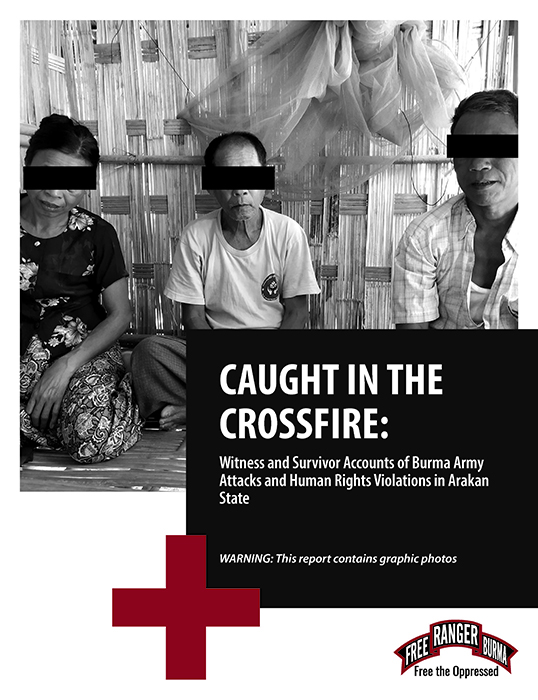CAUGHT IN THE CROSSFIRE: Witness and Survivor Accounts of Burma Army Attacks and Human Rights Violations in Arakan State
10 November 2020
Arakan State, Burma

Introduction
During 2019, Arakan FBR members conducted 178 interviews with villagers in Arakan State who had witnessed and experienced human rights violations because of the conflict. The Rangers then translated the interviews and organized corresponding videos and photos, sending them into FBR headquarters in June 2020. Caught in the Crossfire is the compilation of witness accounts detailing mass human rights transgressions including torture, forced portering, death, injury, destruction of property, and more at the hands of specific Burma Army units.
We would like to acknowledge and thank the Arakan Rangers for their hard work and dedication in collecting these interviews regarding the ongoing conflict in Arakan State. This report would not be possible without their commitment to getting the news out. We are also grateful to the witnesses who shared their stories and without whose courage in coming forward this report would not have been possible.
Situation and Report Overview
Over 18 years ago, Burma ratified the 4th Geneva Convention, agreeing to follow the basic principles protecting civilians during times of war. Since that signing, the Burma Army, with the support of the central Burma government, has done the exact opposite. From massacring the Karen in eastern Burma, to launching aerial attacks against civilians in Kachin State, to committing genocide against the Rohingya, it’s evident that the Burma Army and Burma government continue to violate international law regarding civilians.
After committing genocide against the Rohingya in 2017, the Burma Army switched its focus to the Arakan (Rakhine) people who, like the Rohingya, live in Arakan (Rakhine) State. Civilians living there, regardless of religion, continue to suffer in the indiscriminate violence of the Burma Army’s attempts to defeat the Arakan Army. In recent months, more than 10,000 Chin (who are mostly Christian), Arakan (who are primarily Buddhist), and Khumi (mostly Christian) villagers, have been displaced in Chin State as fighting between the Burma Army and Arakan Army has spilled across the border into Chin State. Additionally, 70,000 mostly Buddhist Arakan villagers have been displaced in the last year and over one million Rohingya villagers (who are primarily Muslim) remain displaced from their homes and living in refugee camps in Bangladesh.
The interviews highlighted in pages 13 to 27 show the Burma Army continues a longstanding practice of using violence against civilians in its efforts to defeat the ethnic armed organizations (EAOs) who are trying to defend their people. While the interviews were conducted in 2019, reports from this year show that the atrocities detailed by witnesses continue to this day.
Recommendations for Action
We believe the international community should do the following:
- Recognize the ethnic governments and engage with them on the same level as the Burma government. Many EAOs operate as de facto local governments, providing services and administrative governance to conflict-affected communities, giving them more credibility and legitimacy among local communities than the central or State government.
- Provide humanitarian assistance directly to those under attack through ethnic governments and organizations and not through the Burma Army, the Burma government, or companies and organizations with ties to the Burma Army.
- Continue encouraging the Burma central government and military toward genuine democracy, freedom, and human rights, and holding them accountable when they violate the basic human rights they’ve agreed to protect.
These are just starting points. Ethnic organizations and governments have the capacity and the proven ability to help their own people. Doing all this at once can save lives and shows the Burma Army that these attacks will not be accepted. We continue to stand with the ethnic people of Burma and pray for lasting peace and freedom throughout the country.
The report is available for download through the cover image above and additional information is available by emailing us at media@freeburmarangers.org.
Thank you and God bless you,
Dave Eubank and the Free Burma Rangers
